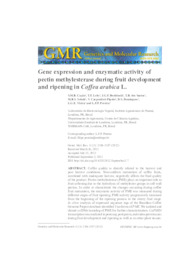Gene expression and enzymatic activity of pectin methylesterase during fruit development and ripening in Coffea arabica L.
Gene expression and enzymatic activity of pectin methylesterase during fruit development and ripening in Coffea arabica L.
Autoria: CAÇÃO, S. M. B.; LEITE, T. F.; BUDZINSKI, I. G. F.; SANTOS, T. B.; SCHOLZ, M. B. S.; CARPENTIERI-PIPOLO, V.; DOMINGUES, D. S.; VIEIRA, L. G. E.; PEREIRA, L. F. P.
Resumo: Coffee quality is directly related to the harvest and post harvest conditions. Non-uniform maturation of coffee fruits, combined with inadequate harvest, negatively affects the final quality of the product. Pectin methylesterase (PME) plays an important role in fruit softening due to the hydrolysis of methylester groups in cell wall pectins. In order to characterize the changes occurring during coffee fruit maturation, the enzymatic activity of PME was measured during different stages of fruit ripening. PME activity progressively increased from the beginning of the ripening process to the cherry fruit stage. In silico analysis of expressed sequence tags of the Brazilian Coffee Genome Project database identified 5 isoforms of PME. We isolated and cloned a cDNA homolog of PME for further characterization. CaPME4 transcription was analyzed in pericarp, perisperm, and endosperm tissues during fruit development and ripening as well as in other plant tissues. Northern blot analysis revealed increased transcription of CaPME4 in the pericarp 300 days after flowering. Low levels of CaPME4 mRNAs were observed in the endosperm 270 days after flowering. Expression of CaPME4 transcripts was strong in the branches and lower in root and flower tissues. We showed that CaPME4 acts specifically during the later stages of fruit ripening and possibly contributes to the softening of coffee fruit, thus playing a significant role in pectin degradation in the fruit pericarp.
Ano de publicação: 2012
Tipo de publicação: Artigo de periódico
Unidade: Embrapa Café
Palavras-chave: Coffea Arábica, Gene expression, Plant development, Ripening, Seed maturation, Seed quality
Observações
1 - Por padrão são exibidas publicações dos últimos 20 anos. Para encontrar publicações mais antigas, configure o filtro ano de publicação, colocando o ano a partir do qual você deseja encontrar publicações. O filtro está na coluna da esquerda na busca acima.
2 - Para ler algumas publicações da Embrapa (apenas as que estão em formato ePub), é necessário ter, no celular ou computador, um desses softwares gratuitos. Sistemas Android: Google Play Livros; IOS: iBooks; Windows e Linux: software Calibre.
Acesse outras publicações
Acesse a Base de Dados da Pesquisa Agropecuária (BDPA) para consultar o acervo completo das bibliotecas da Embrapa.

